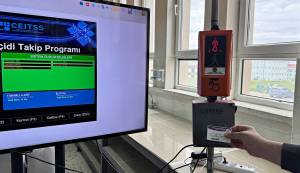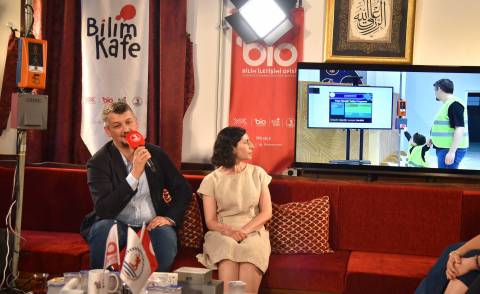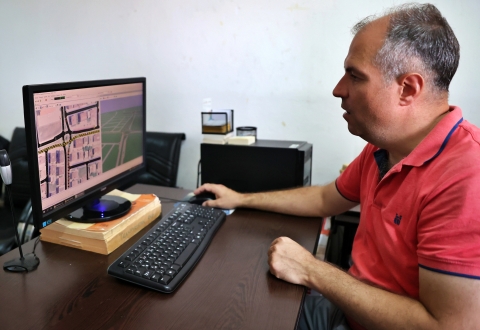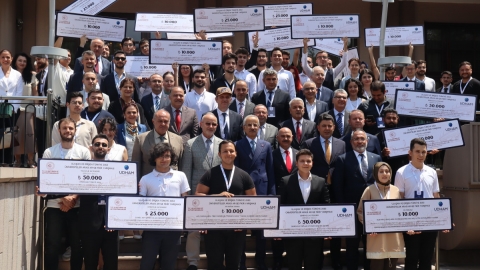Award-Winning AI-Driven Pedestrian Crossing System from OMU Enhances Safety and Efficiency
Ondokuz Mayıs University (OMU) has developed an AI-based signaling system aimed at ensuring safe pedestrian crossing while also improving traffic efficiency by saving drivers time.
The project, titled “Development of a Tracking-Based Smart Pedestrian Crossing Signal System at Crosswalks”, was coordinated by Recep Arslan, a staff member of OMU’s Directorate of Student Affairs, and was developed in six months in the CEITSS Lab, a research laboratory established to support Türkiye’s national vision for digitalization in transportation technologies. The project team includes Assoc. Prof. Dr. Metin Mutlu and Assoc. Prof. Dr. Mehmet Fatih Yılmaz from the Department of Civil Engineering (Transportation Division), Dr. Durmuş Özkan Şahin from the Department of Computer Engineering, Computer Engineer Recep Arslan, Electrical and Electronics Engineering student Fuat Yavuz, and Civil Engineering student Zahid Enes Genç.
Last month, the project was awarded the “Academic R&D Award” at the 8th Intelligent Transport in Mobility Awards, organized by Intelligent Transportation Systems Türkiye (ITS Türkiye) under the Ministry of Transport and Infrastructure, which seeks to make Türkiye's transport systems smarter, safer, more efficient, and sustainable.
A System that Adapts in Real-Time to Pedestrian Needs
The system uses sensors to detect the number of regular pedestrians and assigns a standard crossing time. However, for elderly or disabled individuals, the system offers extended crossing times if they scan their personalized transport cards at a designated reader.
If the system detects a person in the crosswalk area in real-time, it activates the green pedestrian light. If no pedestrian is present, it allows uninterrupted traffic flow, enabling drivers to save time.
Toward More Efficient Traffic Flow
Speaking to Anadolu Agency (AA), Recep Arslan stated that they developed an innovative system that allows signalization at pedestrian crossings to be managed dynamically based on individual tracking.
Arslan explained that conventional pedestrian signal systems operate on fixed time intervals or are activated by the press of a pedestrian button. “Our AI-supported project offers a data-driven and safety-first infrastructure solution for an important need in urban transportation. The system instantly detects pedestrian presence using radar sensors and activates the green light accordingly. If no pedestrian is detected, the existing traffic flow continues. This enhances traffic efficiency and supports environmental sustainability,” he said.
Personalized Crossing Time for Everyone
Arslan highlighted that the project also provides personalized solutions for elderly and disabled individuals by using customized transportation cards: “The system prioritizes social inclusion by offering personalized crossing durations. Our goal is to make traffic lights smarter and offer a safer, more efficient, and environmentally friendly traffic experience for both pedestrians and drivers. By reducing unnecessary stops and starts, the system helps cut fuel consumption and carbon emissions while increasing signalization efficiency.”
Arslan also emphasized that the project will contribute to future research by collecting statistical data:
“By retrieving data from the central system based on the information in users’ transport cards, we can record statistical information for disabled individuals and others. For example, a person in a wheelchair might be granted 30 seconds, a visually impaired individual 15 seconds, while hearing-impaired or other special-needs individuals may receive slightly shorter durations. We also aim to adapt the system for school zones to prevent accidents involving children. We continue to collaborate with various municipalities such as Samsun Metropolitan Municipality, Tokat Municipality, Kocaeli Metropolitan Municipality, and Konya Metropolitan Municipality through the ITS Türkiye Association.”



















